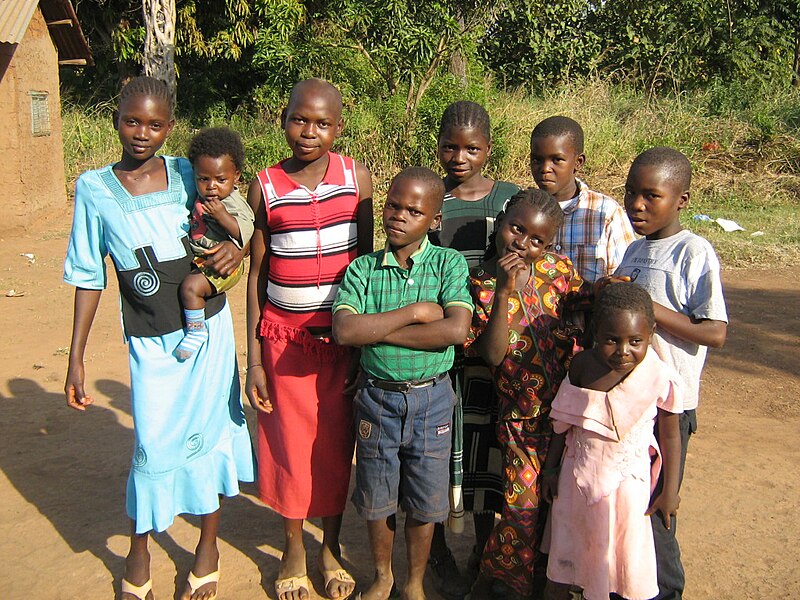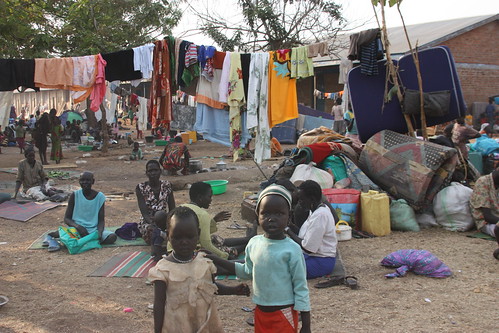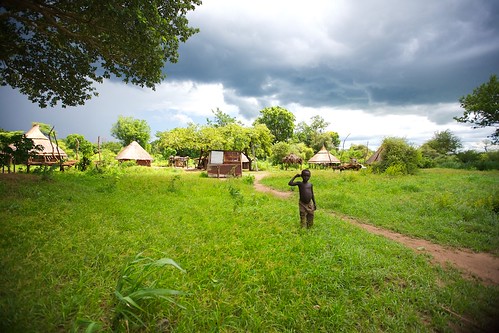Adopting from South Sudan
Contents
Hague Convention Information
The Republic of South Sudan is not party to the Hague Convention on Protection of Children and Co-operation in Respect of Intercountry Adoption (Hague Adoption Convention). Intercountry adoptions of children from non-Hague countries are processed in accordance with 8 Code of Federal Regulations, Section 204.3 as it relates to orphans as defined under the Immigration and Nationality Act, Section 101(b)(1)(F).
The 2008 Child Act of Southern Sudan provides a legal framework for adoption in the newly-independent South Sudan. Prospective adoptive parents are cautioned, however, that the lack of judicial resources in South Sudan may mean that any adoption or custody decree issued by courts in South Sudan may be insufficient for the purposes of U.S. immigration petitions.
U.S. IMMIGRATION REQUIREMENTS FOR INTERCOUNTRY ADOPTIONS
To bring an adopted child to the United States from the Republic of South Sudan, you must meet eligibility and suitability requirements. The U.S. Department of Homeland Security, U.S. Citizenship and Immigration Services (USCIS) determines who can adopt under U.S. immigration law.
Additionally, a child must meet the definition of orphan under U.S. immigration law in order to be eligible to immigrate to the United States on an IR-3 or IR-4 immigrant visa.
Who Can Adopt
In addition to U.S. immigration requirements, you must also meet the following requirements in order to adopt a child from the Republic of South Sudan:
Residency
Foreigners seeking adoption of a child in South Sudan must show three years residency in South Sudan. The Child Act of 2008 does not address whether residency requirements would apply for prospective adoptive parents that may hold South Sudanese citizenship but do not live in South Sudan.
Age of Adopting Parents
Prospective adoptive parents must be at least 25 years old and at least 21 years older than the child adopted. If married, at least one person must be at least 25 years old.
Marriage
Prospective adoptive parents may be single or married. Adoption of a child of the opposite sex by a single prospective adoptive parent is prohibited, unless justified by special circumstances by the court. South Sudan law prohibits adoption by “homosexual or lesbian” individuals or couples.
Income
The prospective adoptive parent(s) must satisfy the court that they have sufficient livelihood to care for the child.
Other
Adoption is prohibited if one or both, if married, of the prospective adoptive parents are not of sound mind, or has been charged and convicted of a criminal offense.
Who Can Be Adopted
In addition to U.S. immigration requirements, the Republic of South Sudan has specific requirements that a child must meet in order to be eligible for adoption:
ELIGIBILITY REQUIREMENTS:
RELINQUISHMENT: Adoption orders may be issued for any child in South Sudan, even if the child was not born in South Sudan. Written consent must be given by the birth mother after the birth of the child, the birth father, legal guardian, or any other person responsible for the child by virtue of any order or agreement to contribute to the maintenance of the child. The court may also require the consent of any person that may have rights or obligations with respect to the child under customary laws. The court may not require such consents if it is satisfied that the individual cannot be found, is incapable of providing consent, or has persistently neglected or ill-treated the child.
ABANDONMENT: No requirements specified.
AGE OF ADOPTIVE CHILD: If the child is at least 10 years old, they must consent to the adoption. If under the age of 10, the opinion of the child on the adoption may be taken into consideration.
SIBLING ADOPTIONS: No requirements specified.
WAITING PERIOD OR FOSTER CARE: Foreigners seeking to adopt a child in South Sudan must have fostered the child for at least one year prior to filing an adoption application. The child must be declared available for adoption in order for a court to issue an adoption or custody decree. Caution: Prospective adoptive parents should be aware that not all children in orphanages or children’s homes are adoptable. In many countries, birth parents place their child(ren) temporarily in an orphanage or children’s home due to financial or other hardship, intending that the child return home when this becomes possible. In such cases, the birth parent(s) have rarely relinquished their parental rights or consented to their child(ren)’s adoption.
How to Adopt
Adoption Authority
The Republic of South Sudan’s Adoption Authority
Ministry of Gender, Child, and Social Welfare
The Process
The process for adopting a child from the Republic of South Sudan generally includes the following steps:
- Choose an adoption service provider
- Apply to be found eligible to adopt
- Be matched with a child
- Adopt [or obtain custody of] the child in the Republic of South Sudan
- Apply for the child to be found eligible for orphan status
- Bring your child home
1. Choose an Adoption Service Provider
The recommended first step in adopting a child from the Republic of South Sudan is to decide whether or not to use a licensed adoption service provider in the United States that can help you with your adoption. Adoption service providers must be licensed by the U.S. state in which they operate. The Department of State provides information on selecting an adoption service provider on its website.
The Child Act of 2008 does not address whether adoption service providers are permitted to operate in the Republic of South Sudan. The law requires that a social worker assist in the preparation of a report to the court on the identity, adoptability, background, social environment, family and medical history of the child, as well as any special needs of the child.
2. Apply to be Found Eligible to Adopt
In order to adopt a child from the Republic of South Sudan, you will need to meet the requirements of the Government of the Republic of South Sudan and U.S. immigration law. You must submit an application to be found eligible to adopt with the Republic of South Sudan.
Applications for adoption of child in South Sudan should be submitted to a court. Adoption applications by foreign prospective adoptive parents must be submitted to the High Court. Foreigners seeking to adopt must demonstrate they have:
- 1. Established residence in South Sudan for a minimum of 3 years;
- 2. Fostered the child for at least one year;
- 3. Have no criminal record;
- 4. Have an approved recommendation of suitability to adopt issued by an authorized person or entity in their country of origin;
- 5. Satisfy the court that their country of origin will respect and recognize the adoption order;
- 6. Satisfy the court that the child adopted will be authorized to enter and permanently reside in the prospective adoptive parent’s country of origin.
The court may impose additional terms and conditions in the decree for adoptions by foreign prospective adoptive parents.
To meet U.S. immigration requirements, you may also file an I-600A, Application for Advance Processing of an Orphan Petition with U.S. Department of Homeland Security’s U.S. Citizenship and Immigration Services to be found eligible and suitable to adopt.
3. Be Matched with a Child
If you are eligible to adopt, and a child is available for intercountry adoption, the central adoption authority or other authorized entity in the Republic of South Sudan will provide you with a referral. Each family must decide for itself whether or not it will be able to meet the needs of and provide a permanent home for a particular child.
The Child Act of 2008 requires that an authorized person declare the child available for adoption. Additionally, the Child Act requires a registry of adopted children be kept and maintained by an authorized person. There is no information available on how such an authorized person makes the determination on a child’s adoptability or any procedures for matching prospective adoptive children with prospective adoptive parents.
The child must be eligible to be adopted according to the Republic of South Sudan’s requirements, as described in the Who Can Be Adopted section. The child must also meet the definition of orphan under U.S. immigration law.
4. Adopt or Obtain Legal Custody of Child in the Republic of South Sudan
The process for finalizing the adoption (or gaining legal custody) in Serbia generally includes the following:
- ROLE OF ADOPTION AUTHORITY: The Ministry of Gender, Child, and Social welfare is responsible for establishing adoption policy.
- ROLE OF THE COURT: The court determines whether the proposed adoption is in the best interests of the child and issues the adoption decree. The High Court determines whether foreign prospective adoptive parents meet the requirements to adopt a child in South Sudan.
- ROLE OF ADOPTION AGENCIES: It is unclear whether adoption service providers are permitted to operate in South Sudan.
- ADOPTION APPLICATION: The adoption application should be submitted to the High Court.
- TIME FRAME: There is no information available on the duration of the adoption process in South Sudan.
- ADOPTION FEES: There is no information available on fees charged for steps in the adoption process in South Sudan.
- DOCUMENTS REQUIRED: There is no specific list of documents required available. However, the adoption application should demonstrate the following:
- 1. That the prospective adoptive parents have established residence in South Sudan for a minimum of 3 years;
- 2. That the prospective adoptive parents have fostered the child for at least one year;
- 3. That the prospective adoptive parents have no criminal record;
- 4. That the prospective adoptive parents are of sound mind;
- 5. That the prospective adoptive parents meet the requirements to adopt in South Sudan;
- 6. That the prospective adoptive parents have an approved recommendation of suitability to adopt issued by an authorized person or entity in their country of origin;
- 7. Documentation to satisfy the court that their country of origin will respect and recognize the adoption order;
- 8. Documentation to satisfy the court that the child adopted will be authorized to enter and permanently reside in the prospective adoptive parent's country of origin.NOTE: Additional documents may be requested.
- Authentication of Documents: You may be asked to provide proof that a document from the United States is authentic. If so, the Department of State, Authentications Office may be able to assist.
5. Apply for the Child to be Found Eligible for Orphan Status
After you finalize the adoption (or gain legal custody) in the Republic of South Sudan, the Department of Homeland Security, U.S. Citizenship and Immigration Services must determine whether the child meets the definition of orphan under U.S. immigration law. You will need to file a Form I-600, Petition to Classify Orphan as an Immediate Relative.
6. Bring Your Child Home
Once your adoption is complete (or you have obtained legal custody of the child), you need to apply for several documents for your child before you can apply for a U.S. immigrant visa to bring your child home to the United States:
- 1. Birth Certificate
If you have finalized the adoption in the Republic of South Sudan, you will first need to apply for a new birth certificate for your child. Your name will be added to the new birth certificate.
If you have been granted custody for the purpose of adopting the child in the United States, the birth certificate you obtain will, in most cases, not yet include your name.
Birth certificates are normally provided at birth by hospitals through agreements with the state government. There is no known precedent for adoptive parents obtaining an amended birth certificate.
- 2. Republic of South Sudan Passport
Your child is not yet a U.S. citizen, so he/she will need a travel document or passport from the Republic of South Sudan.
Passports can be obtained through the Ministry of Interior’s Directorate of Immigration. Prior to this, however, a certificate of nationality must be obtained through the Directorate of Nationality. Each of these steps takes approximately seven days. The cost for a passport is 450 South Sudanese pounds at the time of writing (June 2013).
- 3. U.S. Immigrant Visa
After you obtain the birth certificate and passport for your child and you have filed Form I-600, Petition to Classify Orphan as an Immediate Relative, you then need to apply for a U.S. immigrant visa for your child from the U.S. Embassy in Nairobi. This immigrant visa allows your child to travel home with you. As part of this process, the Consular Officer must be provided the Panel Physician’s medical report on the child.
You can find instructions for applying for an immigrant visa on the U.S. Embassy in Nairobi’s website.
Child Citizenship Act
For adoptions finalized abroad prior to the child's entry into the United States: A child will acquire U.S. citizenship upon entry into the United States if the adoption was finalized prior to entry and the child otherwise meets the requirements of the Child Citizenship Act of 2000.
For adoptions finalized after the child's entry into the United States: An adoption will need to be completed following your child's entry into the United States for the child to acquire U.S. citizenship.
Please be aware that if your child did not qualify to become a citizen upon entry to the United States, it is very important that you take the steps necessary so that your child does qualify as soon as possible. Failure to obtain citizenship for your child can impact many areas of his/her life including family travel, eligibility for education and education grants, and voting.
Read more about the Child Citizenship Act of 2000.
Traveling Abroad
Applying for Your U.S. Passport
A valid U.S. passport is required to enter and leave South Sudan. Only the U.S. Department of State has the authority to grant, issue, or verify U.S. passports. Getting or renewing a passport is easy. The Passport Application Wizard will help you determine which passport form you need, help you to complete the form online, estimate your payment, and generate the form for you to print-all in one place.
Obtaining Your Visa
In addition to a U.S. passport, you also need to obtain a visa. A visa is an official document issued by a foreign country that formally allows you to visit. Where required, visas are attached to your passport and allow you to enter a foreign nation. To find information about obtaining a visa for South Sudan, see the Department of State's Country Specific Information.
Staying Safe on Your Trip
Before you travel, it's always a good practice to investigate the local conditions, laws, political landscape, and culture of the country. The State Department is a good place to start. The Department of State provides Country Specific Information for every country of the world about various issues, including the health conditions, crime, unusual currency or entry requirements, and any areas of instability.
Staying in Touch on Your Trip
When traveling during the adoption process, we encourage you to register your trip with the Department of State. Travel registration makes it possible to contact you if necessary. Whether there's a family emergency in the United States, or a crisis in South Sudan, registration assists the U.S. Embassy or Consulate in reaching you. Registration is free and can be done online.
After Adoption
What resources are available to assist families after the adoption?
Many adoptive parents find it important to find support after the adoption. Take advantage of all the resources available to your family -- whether it's another adoptive family, a support group, an advocacy organization, or your religious or community services.
Here are some good places to start your support group search:
Child Welfare Information Gateway
North American Council on Adoptable Children
Adoption Services Support Group for Adopting Persons
Contact Information
U.S. Embassy in the Republic of South Sudan
Kololo Road Juba Tel: +211 912 105 188 Email: ACSJuba@state.gov Internet: U.S. Embassy South Sudan
Republic of South Sudan’s Adoption Authority
Ministry of Gender, Child, and Social Welfare Ministries Road Juba
Embassy of the Republic of South Sudan
Address:1233 20th street NW. Suite 602 Washington, D.C. 20036 Tel: 202-293-7940 Fax: 202-293-7941 Internet: Embassy of South Sudan
Office of Children’s Issues
U.S. Department of State CA/OCS/CI SA-17, 9th Floor Washington, DC 20522-1709 Tel: 1-888-407-4747 Email: AskCI@state.gov Internet: U.S. Department of State
U.S. Citizenship and Immigration Services (USCIS)
For questions about immigration procedures: National Customer Service Center (NCSC) Tel: 1-800-375-5283 (TTY 1-800-767-1833) Internet: USCIS
For questions about filing a Form I-600A or I-600 petition:
National Benefits Center Tel: 1-877-424-8374 (toll free); 1-816-251-2770 (local) Email: NBC.Adoptions@DHS.gov
SOURCE
Intercountry Adoption, Bureau of Consular Affairs. U.S. Department of State Country Information[1]










